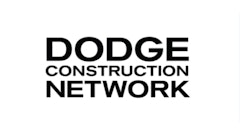
In the construction industry, discussions about the potential of artificial intelligence (AI) to help companies both work and build smarter have ranged from using AI for project planning and design to employing the technology for construction site management and energy optimization at maintenance facilities. All that buzz has produced more confusion than adoption, raising two key questions: where should we begin to achieve the most immediate and impactful results, and does every AI implementation require expensive custom development?
The answer to the first question is that the most direct route to a successful AI experience is to focus initially on cutting back-office overhead and growing your sales pipeline. The answer to the second is that custom applications are not always necessary. Pre-built AI solutions that can be easily tailored to each firm’s needs can now help tame the flood of paperwork created by outdated information-gathering processes, automate administrative tasks and take advantage of newer tools like ChatGPT to improve lead generation.
Here are six practical use cases that enable you to put AI to work in your business quickly, affordably and with measurable bottom-line results, providing a strong edge in today’s fiercely competitive construction environment.
1. The Quoting AI Agent: Stop Wasting Time on Paperwork, Win More Bids
Every job starts with a quote, and you know how much time it takes to get one right. Manually interpreting blueprints, counting materials, and estimating hours is a tedious, labor-intensive process. It’s a major bottleneck that keeps you from bidding on more projects.
An AI-powered Quoting Agent changes the game entirely. These intelligent systems can instantly read blueprints, identify specs, quantify materials, and generate precise cost estimations with incredible speed. It’s not just about being faster; it’s about freeing you up to focus on what you do best. By automating this process, you can bid on more jobs, enhance your accuracy, and spend less time at the office, ultimately boosting your profitability and keeping your crews busy.
2. Intelligent Data Management: Your Project History, a Click Away
How much time have you wasted trying to find that one key document from a job you did years ago – perhaps a safety record for a subcontractor, a specific supplier’s invoice, or a project’s materials list? All that information is locked away in various files, computers and emails. This unorganized data is a constant headache.
An AI-driven data management solution turns that headache into a powerful advantage. It centralizes all your project data, no matter where it was originally stored. Using simple language, you can now find exactly what you need in seconds, not days. This improves your operational productivity by giving you instant access to your company’s collective knowledge, allowing you to make smarter decisions faster and keep projects moving forward without costly delays.
3. The Bid & RFP AI Agent: Beat the Competition with Data-Driven Bids
To win the big jobs, you need to submit more than just a good price; you need a powerful proposal. Manually researching public bids and gathering intelligence on a project’s location or client is time-consuming and often based on guesswork.
This is where the Bid & RFP AI Agent provides a serious advantage. The AI can find and monitor all available bids, including public ones. More importantly, it automatically gathers thousands of data points about a potential project, analyzing the neighborhood, building history, and market conditions. This lets you go from a standard proposal to a data-driven, pre-written one in minutes. The AI leverages this information to inform your best strategy, pricing, timeline, and even recommend specific approaches, helping you submit a customized bid that stands out and significantly increases your chance of winning.
4. Harnessing AI for Next-Generation Lead Generation: Get the Phone to Ring
How do new clients find you? They go online and they ask questions. But now, they're using platforms like ChatGPT to get recommendations: "Who are the top contractors for commercial builds?" or "Which firms have the best safety record for industrial projects?"
This is your opportunity to get ahead. Being proactive and using AI to show up on these platforms will capture new, high-value leads. An AI-powered marketing strategy can help you understand these natural language queries and automatically generate content that highlights your firm’s unique strengths and experience. By integrating this into your business now, you can get a jump on the competition and ensure that the phone keeps ringing with qualified clients.
5. Automating Accounts Payable and Receivable: Less Headaches, Better Cash Flow
For any business, cash flow is everything. Yet, the essential processes of paying bills and collecting from clients are often manual, prone to errors, and a huge drain on time. From processing hundreds of supplier invoices to chasing down late payments, these tasks take you away from the job site.
AI-powered solutions for Accounts Payable and Receivable are exceptionally good at these transactional duties. They can automatically extract and verify data from invoices, flag discrepancies, and send automated payment reminders. The financial impact is immediate: less administrative overhead, fewer errors, and a more robust cash flow. By letting AI handle these tedious tasks, your team can focus on what truly matters: keeping projects on schedule and on budget.
6. AI for Administrative Automation: Ditch the Paperwork, Get Back in the Field
Administrative work in construction firms can be a nightmare, pulling valuable people away from managing projects and focusing on safety. Previous automation tools were often too rigid for the unpredictable reality of a job site.
With advanced AI and Large Language Models, the scope for administrative automation has expanded dramatically. AI bots can now handle a wide array of non-core tasks: automatically creating CRM entries after a meeting, drafting routine safety updates, checking inventory levels, and sending reminders to subcontractors about deadlines. This isn't just about eliminating busy work. It's about enhancing productivity and empowering your project managers and crew to focus on the high-value work that directly impacts quality and your company's profitability.
While adopting AI may seem like a heavy lift with unclear benefits, beginning with these six use cases will pay off quickly and affordably. They offer the most direct and impactful path to leveraging AI to drive efficiency and create value that will help you stay competitive, profitable and operating at peak administrative productivity.



















